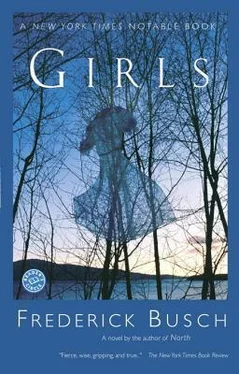“Where’d you get the poster?” I asked the kid. He was the usual: tall, sandy-haired, healthy, Caucasian, dressed from one of the better catalogs.
“A lady taped it on.”
“Today?”
“Yesterday. Hey, I didn’t mean that, about the ticket.”
“No? Why not? It’s your right to behave like an overprivileged candy-ass. Stop shaking. I’m supposed to pretend to show you respect. You can go.”
I left him and stowed the jumper cables. I knew what I’d be finding on the campus today. Another face would have grown overnight on the walls and doors. On the corkboard wall of the student union, where kids advertised their need for lifts to important social centers of the Northeast, there would be this new face, these new eyes I wouldn’t be able to meet.
I thought, as I got back in and put the Jeep in gear, of how Professor Piri had looked at me when she’d said her father was a New York cop. She had looked like someone surrendering.
And how do you mean surrender?
The little girl was from Onondaga County, miles away. There was nothing to do here except look for someone shifty with a little girl. And I wouldn’t see them together, I thought, because the child was probably dead. As Janice Tanner probably was.
I thought of the yellow-gray of her mother’s skin, and I thought of her belief that our lives’ events are orderly, somehow part of a pattern. I also thought I had promised to make an effort.
But how did you mean surrender?
And why not, starting now, name the efforts you can make?
I made my list. Elmo St. John had left word that the investigator for the state police was a sergeant named Bird. I didn’t know him, but I could call, and we could play phone tag for a few days and then maybe talk a little. I knew what he’d tell me. It would add up to being very watchful. There was no physical evidence, but the posters were everywhere, and they would help keep some pressure on. I had called the Tanners and suggested they call the Syracuse, Utica, and Binghamton papers and TV. Mr. Tanner had sounded strangely glad when I asked if he minded doing some recorded messages for the local radio stations to play. I knew there wasn’t a lot that Bird could do, and I was afraid I had done my best in a few phone calls. Still, I hated the druggies in Masonville, and I wouldn’t mind driving there again and this time leaning on some people, especially if Bird gave me his blessing. I doubted he would, but I could ask. Though the last thing the drugheads would want was a girl as young as Janice Tanner. Sex was secondary to most of them. Money came first and last and mostly in between. Drugs filled the hollows. Kids traded energetic, expert sex for drugs when they had to, and when the trade was — I thought of the circulation librarian and his fine tenor voice — doable.
So that was a nothing I could perform.
And I could tell them their girl was under a repair bay in a truck stop someplace. Or in a frozen-over lake, I could say. Or eaten by wolves if out of doors, by rats if in.
She was a local girl. I thought of bracing local thugs, except we didn’t have any. We had violaters of labor laws and health codes, we had income-tax evaders, and we probably had some wife beaters and child abusers, but I didn’t know out-and-out bad guys whose names I could toss around.
I thought, Call Sergeant Bird.
I thought, You call your wife.
From a secretary’s phone in Admissions, I called Elmo’s dispatcher and asked her to relay my request. The boys and girls and their parents were looking at videotapes of the campus they sat in. I went down to the basement to show the flag at the cash-payment window and the soda machines and the bursar’s office and then I drove down to the physical education complex. They had step machines and free weights and lifting machines that cost more than our fleet of four-wheel-drive vehicles. They had an Olympic-size swimming pool and Olympic-quality kids to dive into it and swim it end to end. I was good enough to sink like a weighted sack of cats and thrash and drown.
I did a turn through the off-campus apartments and looked into the lighting in the laundry rooms. We’d had an incident there. Someone had talked too aggressively to a girl. She described herself as a woman in the interview room, and I called her that in my report. But she was a girl. She had freckles across the top of her nose, and she was skinny, but with nice shoulders. She wore one of those floppy-topped sweaters that purposely fell by accident off half of the shoulders and chest of the girl or woman who wore one. I did not mention costume in the interview or report. It was considered bad form. She’d been frightened by a big boy, and she had a right not to be, and I was making sure Buildings and Grounds had increased the lighting and put in a phone.
Next was the cluster of science buildings. They looked like factories. Outside of the physics building, I saw Strodemaster’s high, battered old Land Rover. It looked like it had just come off the desert, pursued by Bedouin shooting movie rifles. I think maybe Strodemaster wished it had. He was parked in the no parking zone in front of the loading dock. I took out one of the cards my administrative vice president had given me as part of the promotion package. It cost them about eleven cents to print the cards up, and you were supposed to feel important — instant cheap morale. On the card, I wrote “Naughty.” I’d give him the ticket next time. He was the kind of man who made you want to provoke him, maybe even hurt him, and partly because he acted like everybody was born with glands, lungs, heart, liver, and the need to make Randy Strodemaster happy.
I drove along to the humanities building, and Dispatch let me know that the New York State Police would meet me at a diner called Junior’s a couple of miles north of town. The cop who’d meet me would be there near one, and he could stay for half an hour. I made sure to be on time. The state policeman had gotten there early. Sergeant Bird was tall, slender, tough, and very politely careful about me. His blue-black skin made the purple of his necktie against the gray of his uniform shirt seem brighter. He drank coffee and chewed on a grilled cheese with tomato sandwich. I became so hungry, I thought I was going to drool. I ordered the same. Junior’s was a big square room with small tables and comfortable wide wooden chairs. The waitress kept pouring extra coffee into cups, and Junior, in the kitchen, listened to tape cassettes of opera while he cooked. His whole name was Ruggiero Nazitto, and he liked to talk about coming to America not to make pizza.
“Good food here,” Bird said.
“He puts garlic on everything.”
“Smart move. So, what’s your interest in my missing kids?”
“The family of Janice Tanner would like more information. They don’t know how to get it. You aren’t volunteering much, apparently. So they asked me to do something. What they asked for is anything, actually.”
“Well, you’re doing anything,” Sergeant Bird said. “What qualifies you to ride the same horse as me?”
“I didn’t say I was. I had a little experience in the service.”
“Which, judging from what I see, was not the day before yesterday.”
“A while ago,” I said. “I was an MP. I got into some stuff and I ended up attached to Intelligence. It was mostly surveillance and, right before I was done, some interrogation.”
“Army?”
I nodded.
“They’re a joke,” he said.
“No,” I said, “Navy Intelligence is a joke. Army’s almost competent. And I was all right. Really. I did some stuff. I found a truckload of missing weapons. I stuffed an outfit of pharmaceuticals merchandisers. You can check me out.”
“The request is already in and working.”
Читать дальше










